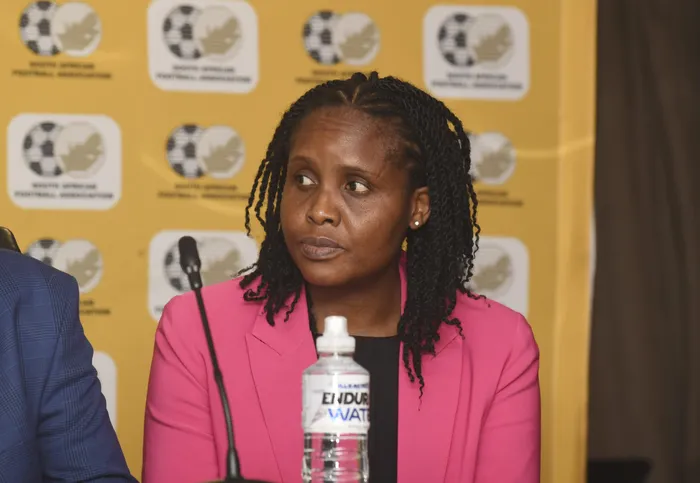POPIA is a game-changer for under-fire SAFA as it halts Parliament's demand for pay details
During a tense parliamentary hearing, SAFA faced criticism over financial disparities as the Protection of Personal Information Act (POPIA) complicated demands for salary transparency.

In the line of fire, the Chief Executive Officer at the South African Football Association, Lydia Monyepao.
Image: Image: BACKPAGEPIX
During a heated virtual parliamentary hearing on Tuesday, the South African Football Association (Safa) came under fire, as it always does.
Among the flashpoints were concerns over financial disparities within the national football coaching staff and the association’s overall governance.
The stark salary contrast between Bafana Bafana coach Hugo Broos and his counterpart, Banyana Banyana coach Desiree Ellis, was a central point of contention that drew passionate, sharp reactions from members of Parliament.
During the session, which saw Safa’s CEO, Lydia Monyepao, at the forefront, tensions escalated when MPs confronted her about the financial inequities between the two coaches.
Monyepao’s insistence on citing the Protection of Personal Information Act as a defence for withholding Broos’s salary drew the panel’s discontent, which sought clarity on the issue.
The hearing, convened by the portfolio committee on sport, arts and culture, was marked by a growing sense of urgency for accountability. ANC MP Gaolatlhe Kgabo proposed an inquiry into Safa’s operations, reflecting the mounting fatigue with governance challenges within South African football.
Safa vice-president Linda Zwane and Monyepao attempted to navigate the scrutiny in the absence of Danny Jordaan, who was attending a CAF function in Morocco. However, the ensuing chaos worsened when only a handful of Safa’s national executive committee (NEC) members were present, prompting MPs and chairperson Joseph McGluwa to insist that all NEC members be present.
As discussions unfolded, Monyepao’s poor internet connectivity hindered her ability to provide adequate responses, further frustrating lawmakers. However, the focus quickly shifted to significant concerns within the national football framework.
A notable flashpoint occurred when the committee debated the allocation of R20-million set aside by Minister of Sport, Arts and Culture Gayton McKenzie for technology related to the forthcoming implementation of the video assistant referee (VAR) system.
The Premier Soccer League (PSL), represented by chairman Irvin Khoza, distanced itself from the discussions, asserting that a lack of clarity made meaningful engagement impractical.
Criticism of Safa was swift and scathing as MPs argued that implementing VAR without input from the PSL, the very body expected to utilise the technology, was both imprudent and premature.
Furthermore, the committee sought explanations regarding Bafana Bafana player Teboho Mokoena, who received two yellow cards and was erroneously fielded against Lesotho, resulting in a regrettable loss of three points that jeopardised the team’s hopes for the 2026 World Cup.
The committee also raised questions about the recent appointment of team manager Vincent Tseka, who allegedly surpassed the mandatory retirement age. Monyepao confirmed that the NEC would need to investigate this appointment further, despite strong recommendations advocating against it.
As Bafana Bafana prepares for upcoming challenges, the call for transparency and fair play extends beyond the pitch, prompting introspection within an organisation at a critical juncture in South African sports history.
Related Topics: